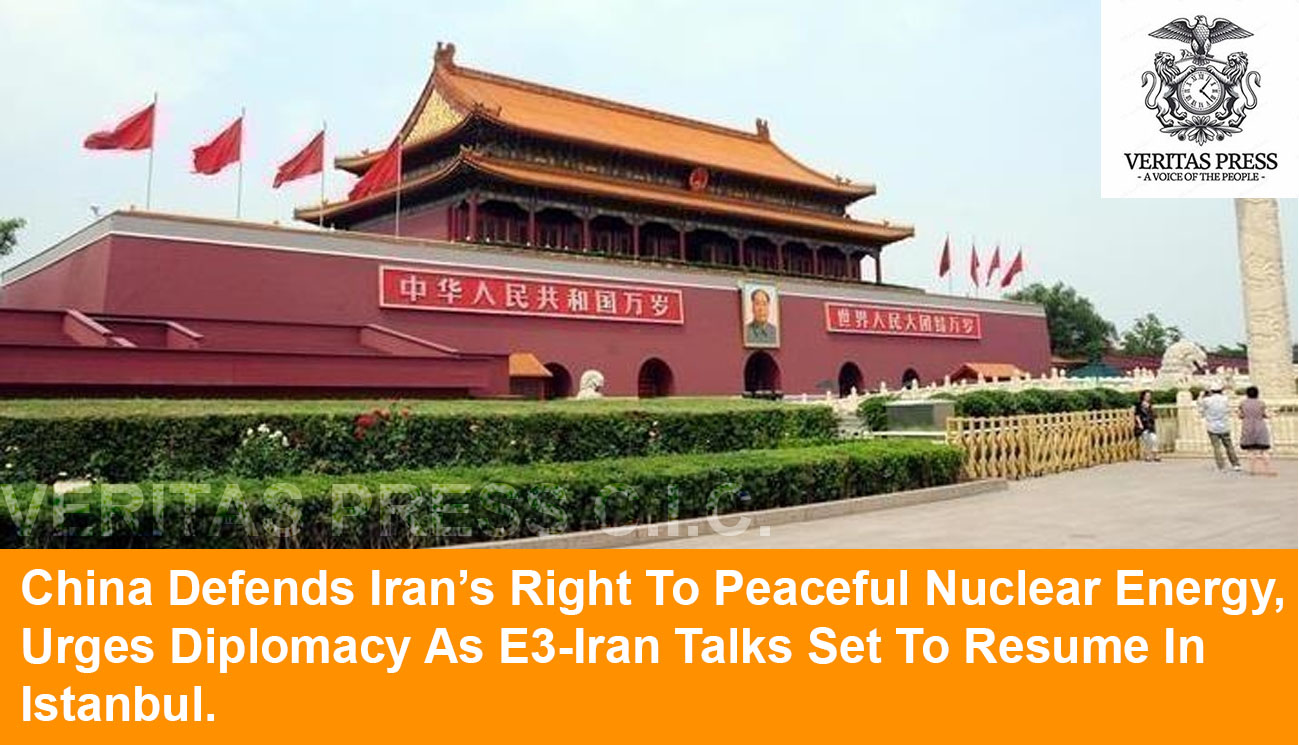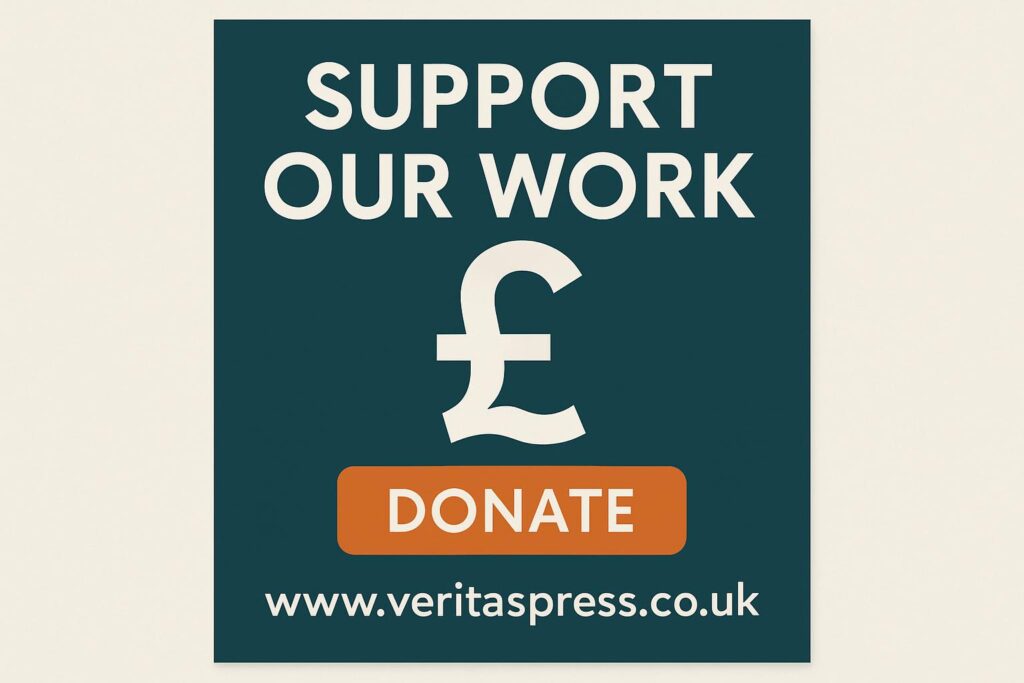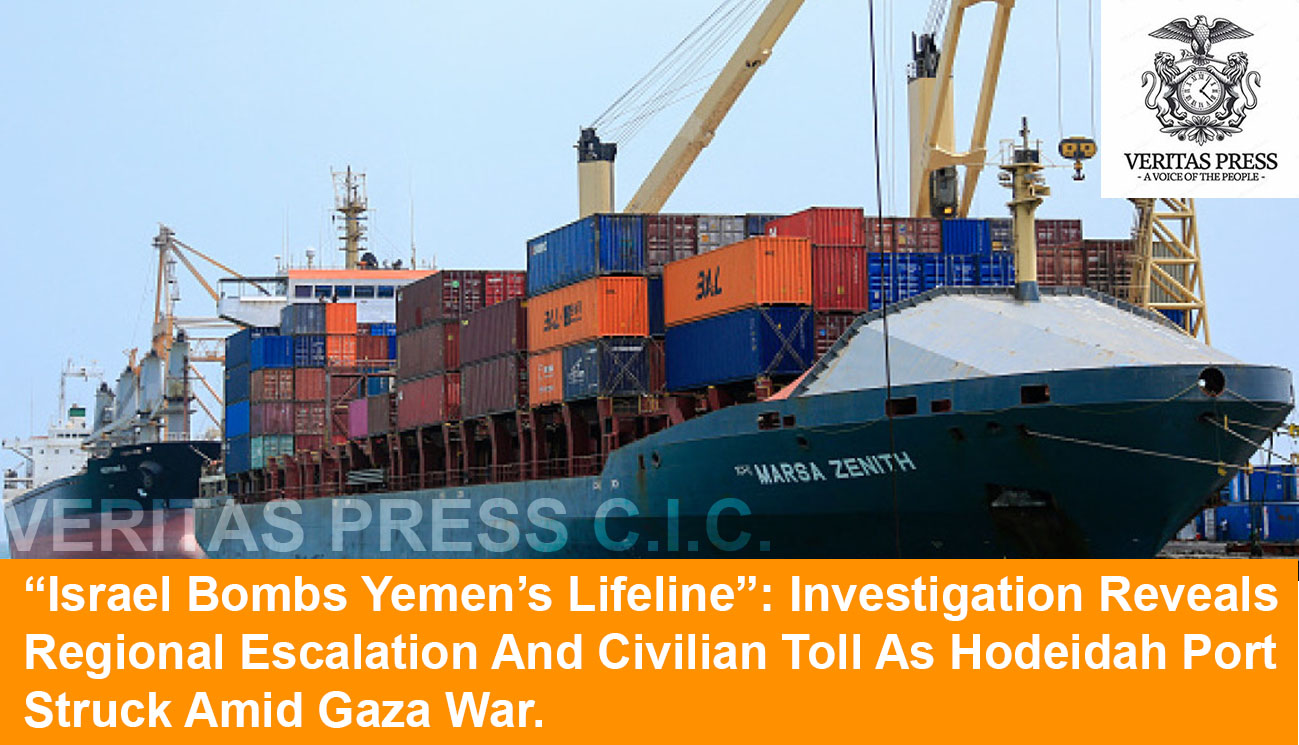Press Release: Veritas Press C.I.C.
Author: Kamran Faqir
Article Date Published: 21 July 2025 at 17:18 GMT
Category: Asia Pacific | China | Iran’s nuclear program
Source(s): Veritas Press C.I.C. | Multi News Agencies
As tensions surrounding Iran’s nuclear program flare anew following a 12-day war sparked by an Israeli airstrike on Iranian territory, China has stepped up its diplomatic efforts to de-escalate the crisis. In a series of high-level engagements, Chinese officials have publicly reaffirmed Tehran’s right to peaceful nuclear energy, criticised Western pressure tactics, and urged all parties to return to the negotiating table.
Vice Foreign Minister Ma Zhaoxu underscored China’s position in a phone call Monday with Frédéric Mondoloni, Director General of Political and Security Affairs at the French Foreign Ministry. “The right of Iran to peacefully utilise nuclear energy should be guaranteed,” Ma said, adding that Beijing remains committed to playing a “positive and constructive role” in resolving the dispute through political and diplomatic channels.
Ma’s remarks come at a critical juncture, as Iran and the European troika, France, Germany, and the UK, prepare to hold fresh nuclear talks in Istanbul on Friday. The meeting, announced by Iranian Foreign Ministry spokesperson Esmaeil Baghaei, will occur at the deputy foreign minister level with participation from EU foreign policy chief Kaja Kallas. The talks aim to revive dialogue that was derailed in June when Israel launched a surprise strike on Iranian soil, killing key Iranian nuclear scientists and triggering a retaliatory conflict.
Beijing’s Unwavering Support For Diplomacy:
Speaking at a Monday press briefing, Chinese Foreign Ministry spokesperson Guo Jiakun echoed Ma’s stance, warning that the Iranian nuclear issue has profound implications for regional peace, global stability, and the integrity of the international nuclear non-proliferation regime.
“China always advocates resolving the Iranian nuclear issue peacefully through political and diplomatic means. This is the only right way forward,” Guo stated. “We call on all parties to walk in the same direction and contribute to the political settlement track.”
Guo confirmed China’s backing for renewed talks in Istanbul and reiterated Beijing’s call for restraint from all sides, implicitly criticising efforts by European states to trigger the United Nations’ so-called “snapback” mechanism, which would reinstate international sanctions on Iran.
Iran Slams European Threats Of Snapback Sanctions:
Iranian Foreign Minister Abbas Araghchi, in a letter to UN Secretary-General António Guterres and EU and Security Council counterparts, fiercely denounced the E3’s snapback threats as illegitimate and hypocritical. He argued that the European powers have forfeited their moral and legal authority through complicity in Israel’s aggression and their failure to uphold the 2015 Joint Comprehensive Plan of Action (JCPOA).
“The E3 lack any legal, political, or moral standing to invoke the mechanisms of the JCPOA and UN Resolution 2231,” Araghchi wrote. “Their support for Israel’s unprovoked military assault, rejection of the core tenets of the nuclear deal, and continued economic coercion render any invocation of snapback sanctions null and void.”
Araghchi reiterated Iran’s position that it remains committed to non-proliferation and has no intention of developing nuclear weapons, but will not renounce its sovereign right to civilian nuclear development.
Iran-China-Russia Coordination Intensifies:
In a signal of deepening strategic cooperation, Iran announced a trilateral meeting with China and Russia set to take place in Tehran on July 22, one day before the Istanbul talks. According to Baghaei, the gathering, hosted at the general director level, will focus on nuclear diplomacy, sanctions relief, and opposition to unilateral Western pressure.
China has emerged as a staunch diplomatic ally to Iran amid increasing threats from the US and Europe. In recent months, Chinese Foreign Minister Wang Yi has held multiple direct meetings with Araghchi, including a high-profile sit-down in Tianjin last week. Wang reiterated Beijing’s firm opposition to the use of force or coercive diplomacy, emphasising that “only political negotiations can resolve the Iranian nuclear issue.”
“We appreciate Iran’s efforts to pursue peace through diplomacy, and we stand ready to support our Iranian partners in defending their legitimate rights and sovereignty,” Wang said. He also reaffirmed China’s support for Iran’s “dignity and independence” in the face of external pressure.
Araghchi, for his part, thanked Beijing for its “invaluable support” and said Tehran is committed to resuming negotiations “on the basis of equality and mutual respect.”
Stalled Talks, Military Escalation, And A Fragile Ceasefire:
The diplomatic overtures come in the wake of one of the most dangerous escalations in the region in years. A planned sixth round of Iran-US nuclear talks in Muscat, Oman, was abruptly cancelled after Israel’s June 13 airstrikes killed top Iranian officials and reportedly damaged nuclear facilities in Natanz, Fordow, and Arak. Iran responded with missile attacks on Israeli military installations, prompting brief but intense fighting that drew in US airpower.
Though a ceasefire took effect on June 24, relations remain tense. Iranian officials have accused Washington of greenlighting the Israeli operation and launching coordinated cyber and kinetic attacks on its nuclear infrastructure. The Biden administration has denied involvement but continues to insist that Iran must “never obtain a nuclear weapon.”
Iranian authorities counter that their nuclear program is strictly peaceful, in line with International Atomic Energy Agency (IAEA) guidelines, and that they will not return to talks unless Western nations abandon “pressure and blackmail” tactics.
Diplomatic Path Fraught But Not Closed:
While hopes for a full revival of the JCPOA remain slim, the Istanbul talks represent a critical opportunity for crisis diplomacy. Analysts warn that without tangible progress, Iran may further expand its uranium enrichment program, and regional rivals may take pre-emptive military steps.
Beijing, however, is doubling down on its peacemaking role. As one of the few major powers with diplomatic credibility on both sides, China has been increasingly assertive in Middle East diplomacy, positioning itself as an alternative to US-led conflict paradigms.
“The current situation requires a collective commitment to de-escalation, not threats or sanctions,” said Xu Bu, director of the China Institute of International Studies, a think tank linked to China’s foreign ministry. “Only diplomacy can prevent a repeat of June’s devastation.”
With regional tensions still simmering and major powers once again drawn into the fray, all eyes are now on Istanbul. Whether dialogue prevails or collapses under the weight of mistrust may well shape the trajectory of nuclear diplomacy, and the broader security landscape of the Middle East, for years to come.
Conclusion: Power Politics, Double Standards, And The Battle Over Iran’s Sovereignty.
The renewed push by Western powers to trigger “snapback” sanctions on Iran, despite their own systematic breaches of the JCPOA, is not merely a question of diplomacy or nuclear oversight. It is a calculated exercise in geopolitical coercion, aimed at perpetuating the imbalance of power in the Middle East and denying Iran its sovereign right to peaceful technological development. China’s growing involvement in this crisis, far from being neutral, is a direct challenge to the West’s hegemony over the international rules-based order, an order increasingly revealed to be arbitrary, selective, and weaponised.
The European troika’s threats ring hollow against their track record: years of failure to honour the economic components of the JCPOA, acquiescence to Washington’s 2018 withdrawal, and silence in the face of Israel’s repeated acts of aggression, culminating in the June 13 airstrikes that killed Iranian civilians and officials. That the E3 now seeks to wield the very mechanism designed to restrain violators of the deal against Iran, is a textbook case of political inversion. Their legal authority to invoke snapback sanctions is flimsy at best, moral authority, non-existent.
Moreover, the diplomatic vacuum created by the collapse of Muscat talks, blown apart by a joint US-Israeli assault on Iranian nuclear sites, has exposed a dangerous truth: the so-called international consensus is not about preventing nuclear proliferation, but about denying independent nations like Iran the means to resist Western and Israeli domination. It is not nuclear weapons that the West fears, but nuclear autonomy.
In stark contrast, Beijing’s consistent defense of Iran’s peaceful nuclear rights and insistence on diplomacy reveals a deep rift in global diplomacy. For China, this is not just about Iran, it is a test case for a multipolar world order where international law is not dictated by power but upheld by principle. The trilateral coordination between Iran, China, and Russia is a clear sign that the Global South is no longer willing to negotiate under duress or accept the West’s monopoly on legitimacy.
The Istanbul talks may offer a temporary reprieve, but the broader trajectory is clear: unless Western powers abandon their coercive tactics and engage with Iran on the basis of equality and mutual respect, they risk not only irreparably damaging what remains of the nuclear accord, they risk accelerating the collapse of trust in the very international institutions they claim to uphold.
The Iranian nuclear issue is no longer just a question of uranium enrichment or sanctions relief. It has become a battleground over the future of global governance, the legitimacy of resistance, and the right of nations to chart their own course without being bombed back to the table.
Advertisements
Tags:






























Leave a Reply